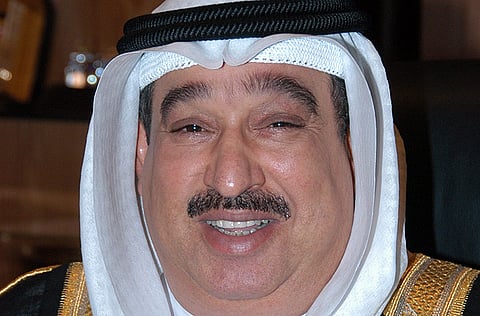Bin Rajab lawyers reject recorded evidence
Former Bahraini minister quizzed in court over money-laundering charges

Manama: The second session of the interrogation of a former state minister charged with involvement in money-laundering operations has ended after his lawyers said that he needed to rest.
The five-member legal team said that the quizzing would be resumed on Thursday afternoon amid expectations that it would last up to ten days.
Former state minister Mansoor Bin Rajab was interrogated for almost seven hours on Tuesday evening and six hours on Wednesday evening.
The lawyers who said that their client, former state minister Mansoor Bin Rajab, on Wednesday denied all charges leveled against him and disputed the veracity of recordings played by the public prosecutor as evidence of his alleged involvement in "criminal activities."
"The recordings cannot be considered evidence. Some are them are fabricated, while others are unclear, more like noises," the lawyers said late on Wednesday evening at the end of the six-hour interrogation session. More recordings are expected to be played by the prosecution.
The legal team said that a senior official be summoned to help shed light on the money-laundering scheme, arguing that he is well aware of the operations. However, the lawyers refused to publicly identify the official.
The legal team said that the authorities should lift the travel ban imposed on Bin Rajab, de-freeze his assets and unblock his banking account to have access to his salary.
"Since the source of his salary is the government, it would be absurd to block it under the claim of the money-laundering implication," the lawyers said.
Bin Rajab denied any link with a six-million-euro cheque at the centre of the investigation and that alleged accomplices, including a Kuwaiti businesswoman, sought to cash in Bahrain and Lebanon.
He also rejected claims that he was given BD30,000 by a stateless man living in Kuwait to help him and his family obtain the Bahraini nationality.
Amal, the Kuwaiti woman who said that she wanted to start a business in Bahrain with the help of Bin Rajab, is still being quizzed for an alleged role in the money-laundering activities.
Kuwaiti daily Al Watan daily said that the police found a euro 300,000 cheque in her car and are questioning her about its origin and purpose.
However, Amal said that she was not aware of its existence and could have been planted there to implicate her, the paper reported, as the mystery about the characters and developments of the scheme deepens.
Ali Jennati, Iran's ambassador to Kuwait denied an Iranian involvement in the money-laundering scandal unraveling in Bahrain and Kuwait, saying that the Revolutionary Guards did not need to launder money.
Media reports said that the Revolutionary Guards were the ultimate beneficiaries of the mutli-million money-laundering scheme unveiled by Bahrain last week.
"We have no information on this case, and we have not received anything from Bahrain or any other country," Jannati said.
"What is sure is that these accusations lack credibility and even if there were money-laundering operations why would they be in Bahrain, and not in Dubai which has greater freedom and openness? The Revolutionary Guards do not need to launder money," he was quoted as saying in a report published on Thursday by Al Rai daily.
The ambassador said that there had been charges of involvement in money-laundering operations against him and his father in the news, but insisted that they were "baseless."
The Revolution Guards Corps was set up shortly after the 1979 Iranian revolution to defend the country's Islamic system.
According to media reports, it has now grown into a major military, political and economic force in Iran with an estimated force of 125,000 active troops. The Corps boasts its own ground forces, navy and air force and controls the paramilitary Basij Resistance Force and the powerful bonyads, or charitable foundations that run a considerable part of the Iranian economy.



